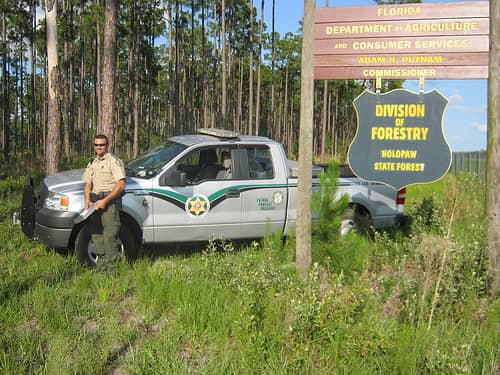FWC, DEP, DACS Enhance Service to Floridians

On July 1, officers and staff from the Department of Environmental Protection (DEP) and the Department of Agricultural and Consumer Services (DACS) will be combined with the Florida Fish and Wildlife Conservation Commission (FWC) in a move directed by the Florida Legislature and approved by Gov. Rick Scott.
The 145 new sworn officers will don FWC uniforms and integrate completely into the ranks of the FWC, resulting in more efficient service to Floridians and visitors.
“We will have more field-level officers available to respond to calls,” said Col. Jim Brown, division director. “New and current FWC officers will be expected to patrol state forests, state parks, wildlife management areas and state waters as a more efficient and effective team.”
The reorganization will save the state more than $3 million over the next five years and $1.28 million in recurring, annual savings.
“Through rearranging extra management and support positions, the consolidation will establish additional patrol and first-response capabilities and expand law enforcement coverage,” Brown said.
The public can expect to see FWC officers in state parks and state forests and call upon them for help.
“We will continue to provide excellent resource protection, boating-and-waterways services and public safety protection,” Brown said.
People should report fish and wildlife crimes, boating violations as well as environmental crimes and state park and state forest issues to the FWC’s Wildlife Alert Hotline: 888-404-3922.
DEP’s Bureau of Emergency Response (BER) will not move to the FWC, but will continue responding to emergency chemical spills and working with law enforcement on environmental crime matters at DEP. DEP’s emergency numbers, #DEP or 877-2-SAVEFL should be used to report environmental emergencies, such as oil and chemical spills.
“The consolidation of officers will provide a more extensive network of environmental crime law enforcement coverage throughout Florida,” said BER Chief Gwen Keenan. “DEP’s Bureau of Emergency Response will continue to work closely with its law enforcement partners on environmental crime issues as it has done in the past.”
In 2011 the Florida Legislature created a Law Enforcement Consolidation Task Force, which met to develop work groups and evaluate functions of several law enforcement agencies. Ultimately, it recommended that DEP’s Division of Law Enforcement be integrated into the FWC’s Division of Law Enforcement. It also suggested that some personnel from the DACS Office of Agricultural Law Enforcement – the officers assigned to patrol state forests and the investigator responsible for commercial aquaculture violations – be incorporated.
“FWC officers in the field have been working alongside DEP and DACS officers for years,” Brown said. “The consolidation simply provides an official, more efficient method of serving the public.”

